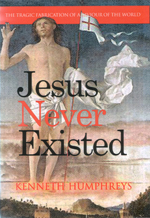
He who has ears
Let him hear!
5-minute enlightenment for those in a hurry
Why is Jesus never short, fat, bald and ugly?
"He hath no form nor comeliness; and when we shall see him, there is no beauty that we should desire him."
– Isaiah 53.2.
Perhaps Jesus DIDN'T look so sweet?
Who has any idea?
Mind of a Christian
"Christianity is not a religion as much as it is a relationship, for Christ WAS alive and I believe He is alive and will be forevermore and I believe I have a friendship with Him and in living day to day striving to live by the teachings of Christ (of which no bad thing can be said against) I try to make myself more like Him."
– Christian writes to Jesus Never Existed
The Perfect Gift
Brighten your home with this delightful memento and help fund Catholic medievalism.
Mind of a Christian
"God is holy, it breaks my heart to hear otherwise, I cannot believe that people think life would be better without Him or Christianity. He is the ultimate power, the beginning and end, He has power over life and death and cannot stand sin. If it were not for Jesus and His sacrifice we would all be doomed eternally."
– Christian writes to Jesus Never Existed
Going through the motions
"Charity means 'Love, in the Christian sense'.. It is quite a different thing from liking or affection ... 'Love' your neighbour ... to please God and obey the law of charity ... It is a state not of the feelings but of the will."
– C. S. Lewis, Mere Christianity.
Charity begins at home
Vast papal palace, Avignon – consumed nearly all the papal revenues during the pontificate of Benedict XII (1334-1342).
Sacred Cow
Fund-raiser for Catholic evangelism with an eye on her own sainthood
Mother Teresa – Albanian nun and honorary American.
"Give until it hurts" she said and amassed a fortune never used for charity work but instead funding convents and nunneries across the world, seducing more young minds with reactionary dogma.
"Mother was very concerned that we preserve our spirit of poverty. Spending money would destroy that poverty ... the millions of dollars accumulating in the bank were treated as if they did not exist."
– Susan Shields, former sister with Missionaries of Charity.
The Glorious Poor "The poor are great! The poor are wonderful! The poor are very generous! They give us much more than we give them... Our food, our dress: it all must be just like the poor. The poor are Christ himself ... – Gem of dubious wisdom from Mother Teresa. |
Calcutta (Kolkata)– NOT all beggars and slums
And the streets are NOT strewn with dead bodies.
A superior kind of nun?
Famed for her work among the destitute of Calcutta Mother Teresa actually spent a great deal of time among the rich and famous.
Abortion – Gravest threat "Abortion is the greatest destroyer of peace." – Gem of dubious wisdom from Mother Teresa when awarded the Nobel Peace Prize in 1971. |
Photo ops galore.
Teresa happily received the Legion d'Honneur from the dictator "Baby Doc" Duvalier.
Baby Doc, like Teresa, loved the poor and did all he could to keep them that way.
Suffering? That's God "I see God in everyone, and especially in those who suffer." – Gem of dubious wisdom from Mother Teresa. |
Friends
Teresa: State funeral but no real crowds
"Difficult it may seem to a Westerner to comprehend, but she was not a significant entity in Calcutta in her lifetime."
– Aroup Chatterjee (resident of Calcutta).
Friend of an earlier saint: Serial Killer
Ecclesiastical Tribunal hears confession from one of its own:
"Messires!
It is quite true that I have robbed mothers of their little ones; and that I have killed their children, or caused them to be killed, either by cutting their throats with daggers or knives, or by chopping off their heads with cleavers; or else I have had their skulls broken by hammers or sticks; sometimes I had their limbs hewn off one after another; at other times I have ripped them open, that I might examine their entrails and hearts; I have occasionally strangled them or put them to a slow death; and when the children were dead I had their bodies burned and reduced to ashes."
– Gilles de Rais, Marshal of France, companion of Joan of Arc, and Carmelite monk, 1440.
PS:
Much of the "Bluebeard" reputation of Gilles de Rais may owe more to the spite of his enemies, the relish of later fans of the macabre, and tourism, than to historical accuracy. His confession was, after all, extracted by torturers of the Inquisition who, doubtless, coveted his immense wealth.
An "arbitration court" of French academics in 1992 exonerated the notorious Marshal and bogeyman. His burial in Notre Dame des Carmes may be the source of the supposition that he was a Carmelite monk.
|
Jesus Christ, for all the wondrous elaborations and embellishments, is an idea, an idea that exists, and has only ever existed, in the minds of his devotees. Take for example the physicality of Jesus. Nowhere do the Gospels (nor any other sources for that matter) describe the phantom superstar – and yet we all know that slender frame, the flowing hair, that soft yet troubled face. The vivid image originates not in history but in the human mind, conditioned over centuries by the Church. We conceptualise the Jesus of our hopes, dreams and expectations. The idea of Jesus is real enough and the idea extends to everything about the superstar – what we think he did, what we think he said, and above all what we think he was. Jesus Christ, in reality, is not an objective fact in the historical record but a "relationship" with our own psyche. Our rational selves might concede that his miraculous deeds are a tad exaggerated; that his words may in fact be taken from other sources, but what he was permits no revision: he was and remains a standard of perfection when real-world people are anything but, and he offers the promise of a life beyond the grave when reality denies any such possibility.
Hocus Pocus – a biological trait ?
It seems increasingly likely that normal gene mutations within the brain gave evolutionary advantage to individuals who could mitigate the evidence of rational thought and their own senses with a belief in an invisible world beyond the grave. By softening death into an afterlife, those humans retained hope in the face of adversity, gained an invigorated purpose in life and increased their chances of reproductive survival. In time all human survivors inherited the "God genes", predisposing humanity towards belief in a supernatural realm. Dreams appeared to confirm its existence, as did the discovery of psychotropic plants and herbs. With the propensity to supernatural belief "hard wired" into the human brain religiously organized societies were a natural concomitant. Priesthoods arose that articulated and manipulated the "religious impulse". This ruling caste regulated and sanctioned communication with the spirit world and established control over the ceremonies of death. Yet rationality and exploration of the natural world advanced man's understanding and provided immediate, tangible comforts. Less the focus of attention be directed away from protective tribal spirits, the priests intruded accentuated dangers and horrors of unbelief into the world of the living and concocted the notion of sacrifice. Ultimately, that sacrifice would be a perfect man, a god in fact, who would come from that invisible world and, in returning, guide those who die to an eternal paradise.
JC and his fans – Impossible Dream meets Grubby Reality
The fans of JC, merely human, have no such luck, no matter how hard they strive to emulate their hero. Even if they persevere for a lifetime, the Christ-like qualities they so admire will elude them. A standard of perfection so absolute permits no fleeting moments of weakness and transgression. They remain sinners.
In practice, therefore, all Christians compromise with sin. Perhaps with some, the sin is nothing worse than the occasional selfish or naughty thought. Others have sinned on a truly monumental scale. Quite a surprising number of popes were murderers: Paschal I (817-824); Sergius III (904-911); John XII (955-964); etc. Gilles de Rais, a pious Carmelite monk, was one of history's earliest recorded serial killers. This companion of Joan of Arc and Marshal of France kidnapped, sodomized, tortured and murdered more than two hundred children. In the twilight zone of Christian absolutes all are inescapably sinners and no amount of saintly behaviour will change that. Fortunately for the brethren the Church has an answer. Amazing Grace
Christian orthodoxy has indeed always had a "get out of jail card" which exonerates even the grossest of sinners, a dogma of convenience which masquerades under the anodyne label "Grace". It originated with St Paul himself. Simply put, no sin is so grave that it cannot be absolved by God's freely given Grace (approach Holy Mother Church for application form; send remittance when applying). This wonderful news means that obeying commandments is quite unnecessary – "His grace" is infinite. A "modern" Christian can get down and dirty with everyone else and still sleep happily at night knowing that salvation is assured by his intellectual belief in the godman myth, so on with the party... For centuries the Church waged a fierce struggle against all sects and heresies which argued for emulation of a Christ-like purity and "Works" of goodness (what a terrible chore). What triumphed was the notion of "Faith" – the simple expedient of "accepting the Lord as Saviour" and submitting to the will of the Church. Catholic orthodoxy made some pretence of "faith shown by works" (such as a crusade against the heathen) but Luther and the Protestants who followed him clarified "justification" (Heaven's entry permit) beautifully:"sola fides" – faith alone. Luther was certain that any attempt to influence God's master plan was an insult to the creator. Calvin went further, arguing the alarming notion that God had already bestowed his irresistible grace and had predestined those who would be saved and those who would be damned. Therefore do what you will, your "works" will not save you. In the asylum of Christendom, faith without goodness got you into heaven; goodness without faith damned you for eternity.
Sweet Charity – or Saving one's own soul?
Of course, to a large extent that is because of those ethics are utterly impractical: "Take no thought for the morrow"? "Give to him that asks"? "Lay not up for yourself treasures upon earth"? "Resist not evil"? "Love your enemies, bless them that curse you, do good to them that hate you"? Luther saw the difficulties in these epithets of nonsense: he called the Sermon on the Mount "the devil's masterpiece"! In any event, no land in history has ever followed the precepts and principles of the Christian godman. Rather, what Christianity has manipulated and profitted from is a very human fear of death. Achieving an immortality snuggled up to Jesus has proved far more of a marketing success than charity for others. Judgment Day And yet some Christians are genuine humanitarians, and would have been so whatever faith they had been acculturized into. Because they cloak their humanity in Christian garb they interpret their compassion and charity in Christian terms, imagining that it is the "example of Jesus" that inspires and encourages them. In another place and time it might have been the example of Muhammad or the Buddha. Their humanitarianism, no doubt also programmed into the human genome as a species survival trait, is to be seen in individuals of all faiths – and of no faith at all for that matter. But also "doing good" is the price ticket some Christians pay to keep in God's good book. Part of the Church's arsenal of terror is the threat of divine retribution. The notion of an individual judgment at the moment of death actually owes more to medieval ponderings (for example, the 1336 Bull "Benedictus Deus" issued by Benedict XII, the heretic hunter) than anything found in scripture. It sits somewhat at odds with the more scriptural "Day of the Judgment" anticipated in both the Old Testament (Joel 2.31, Ezekiel 13.5, Isaiah 2.12) and the New Testament (Matthew 24-25, Acts 10.42) and integral to all early Church dogma (Apostles' Creed, Nicene Creed, etc.). Theologians for centuries wrestled with the conundrum of where, precisely, were the souls of the dead before the great "universal Resurrection"? Purgatory was one solution, which opened the door to the criminal racket of indulgences. But whether it's one judgment or two that we have in store, be assured, every thought, every deed, and every word will be judged.
But what of those heroes of leper colonies and refuges for down-and-outs, few in number, but lionized and raised to sainthood? What of these paragons of Christian virtue? Do they rise above not only the vast majority of insurance-policy Christians, do they even match the humanitarianism shown by those of other faiths or no faith at all?
A Christian exemplar? – The Saint who lived among us
Marketing genius
She formed a group, the Missionaries of Charity, to help street people die with a little dignity and Catholic sacraments ringing in their ears (they were too far gone to realize they were being baptized into a faith they neither knew nor cared for). Her first Home for the Dying opened in 1952 and some 450 others followed, in India and around the world, including an AIDS hospice in New York. Contrary to popular myth, she did not build hospitals or offer medical care to the sick. Teresa's policy was one of non-intervention, in which God decided who was to live and who was to die. She actually ran a primitive and poorly equipped hospice, where "saved" Indians could meet their Christian maker. Although she preserved her own health at costly Western clinics (and had a pace maker fitted) she forbade the purchase of even basic medical equipment for her clinics. Teresa was not interested in making the poor less poor (by, for example, helping them restrict family size) but in making them more Catholic. In Calcutta itself she was all but unknown.
A Media Star for Reaction The late 1950s and early 1960s was a time of crisis and internal dissension in the Roman Church, as it stumbled towards an accommodation with the modern world. The Second Ecumenical Council (Vatican II - 1962-1965) was either the "springtime" of a new Catholicism or the start of the rot which has seen attendance of Mass decline by 66 per cent and the number of teaching nuns fall by 94 per cent. Into this fury of Catholic in-fighting entered "Mother Teresa" and her houses of death, a pinup for the forces of Catholic reaction. Teresa's Christianity was quite simply medieval. She urged the poor to think of their suffering as a "gift from God." She described abortion for rape victims as "pure killing." Her small Calcutta clinics eschewed the use of painkillers in accordance with the primitive doctrine of "redemption of the soul through suffering". A British media luminary (and pious Catholic) Malcolm Muggeridge now took a hand to elevate to stardom the diminutive zealot he so admired with a hagiographic movie "Something Beautiful for God" (1969), proclaiming to a credulous media circus that "an actual miracle had taken place during filming" (a roll of film took on a "curious" colour cast). The exemplar of a good Christian was born and was quickly embraced by a papacy fast retreating from the high tide of liberalism. Jet-setting the world went Teresa, her saintly celebrity rallying the faithful in hot spots of evangelism and extracting funds from Catholics who served Christ vicariously through their chequebook. And the money certainly poured in, notoriously from the likes of the Duvalier gang in Haiti and Charles Keating, the biggest fraudster in US history (the Lincoln Savings and Loan scam). Keating chipped in more than a $million for Teresa and she reciprocated with a character reference for his day in court. The Lord sure moves in mysterious ways. Journalists have estimated the Missionaries of Charity receive as much as US$100 million a year, although no accounts are published. Some maintain that the money is transferred to the Istituto per Opere Religiosi (the Vatican Bank), where it is diverted into non-Christian countries for "missionary work" – more nunneries and convents. A 1991 audit of the UK operation revealed that only 7% of the total income of about US$2.6 million went into charity work. The rest was remitted to the Vatican Bank.
How Reactionary can you get? Ok, abortion isn't nice; contraception may be unnatural; we might even, in a fuzzy moment, nod in agreement with Teresa's quixotic notion that the suffering of the poor is "something very beautiful." But this does not begin to approach the depths of Teresa's medieval insanities. An escapee from the asylum reveals the cold heart of the world's most celebrated "Good Christian."
On 5 September, 1997 Teresa died. Her crony, Pope John Paul II, the most prolific creator of saints in history, couldn't wait to get beatification underway. Precisely one year after Teresa's death the required miracle occurred. A photograph of Mother Teresa beamed a light at a Calcuttan woman and overnight she lost a big tumour. Wow! In October 2002, the Congregation for the Causes of Saints recognised the miracle and a year after that John Paul beatified his old pal. Can any one doubt that the necessary second miracle is just around the corner and a new star will join the firmament? And that's as good as a "Good Christian" gets.
Sources:
Copyright © 2005
by Kenneth Humphreys.
|
|||||||||||||||||||||||||||||||||||||||||||













